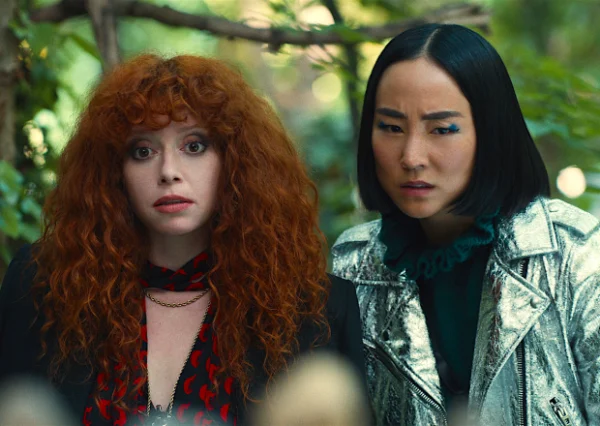WATCH CLOSELY: “Russian Doll” Cracks Open
By Peg Aloi
Russian Doll’s script still crackles with dark, cynical hilarity, and New York is still the gritty, gorgeous backdrop, the city where, clearly, anything can happen.
Russian Doll, Netflix.

A scene from Season 2 of Russian Doll. Photo: Netflix
The eagerly anticipated new season of Russian Doll (Netflix) has dropped, finally, and it soothes our fear, even angst, that it would not remotely approach the originality and excellence of the premiere season. Despite being easily binged in its entirety in one night, this was a bewitching new series many of us lingered over, savoring its intensity, oddity, humor, and pathos. Its ending was a perfect triumph of apotheosis and ambiguity: were we in the realm of the living or the dead? Were those characters emerging from the underworld, or a midtown tunnel? Is this magic realism, urban horror, or black comedy? Or perhaps all three.
As the new season opens, somehow Nadia (Natasha Lyonne, co-creator with Leslye Headland) has managed to reach her 40th birthday and isn’t terribly worried that she will be repeating the events of her 36th. (To recap: the central conceit of the first season revolved around Nadia, a video game designer who lives in Manhattan. She is forced to repeat scenes from her 36th birthday party again and again, like a particularly gruesome Groundhog Day, as she dies a hundred deaths and in the process comes to terms with her life choices and regrets). Her companion in death-derived epiphany, Alan (Charlie Barnett), remains in the picture, but it’s suggested the two of them are content to maintain casual contact and periodically “check in with each other.” I was curious to know more about what has transpired for both of these characters since the finale, where they finally seemed to be free of the repetitive cycle of pain. I also wanted more of Alan’s story, and maybe hoped for him to grow closer to Nadia, whose free-spirited ways felt like a balm to his rigid personality. And while this new season avoids any kind of expository explanations or flashbacks from the past four years, there’s a certain sweet logic to leaving some mysterious gaps in the timeline.
Nadia’s close relationship with her mother’s therapist and de facto foster mother Ruth (the glorious Elizabeth Ashley) continues: their mutual tendency toward acts of self-destructive behavior binds them in love and reproach. Her stylish hipster gal pals are also back: Maxine (Greta Lee), the self-absorbed party hostess, and Lizzy (Rebecca Henderson), an artist and gadabout. Beneath their often annoying exteriors, the pair seem to truly care about Nadia and her existential pain. Curiously absent is Nadia’s estranged lover John (Yul Vazquez). Also less prominent: her strange soulmate connection with a troubled homeless man in the park (the excellent Brendan Sexton III). There’s a sense she has perhaps moved beyond these connections, but it’s not clear why.
The script still crackles with dark, cynical hilarity, and New York is still the gritty, gorgeous backdrop, the city where, clearly, anything can happen. The outrageous fashions of the first season remain, including the wild juxtaposition of Nadia’s signature fiery ringlets with her perennial black ensemble, this time upgraded to include a long trench coat and sunglasses. I noted an even more eclectic assortment of music choices in the soundtrack this time around, some of them outrageous and thrilling. Nadia’s constant stream of witty pop culture references are still dizzying and delightful. The action moves outside of New York at times as well, and the timeline is far more complex in season 2.
It wouldn’t do at all to include specific spoilers in this review, so forgive me for being somewhat vague. The first season followed a fairly straightforward (if somewhat surreal) trajectory, with Nadia’s repeated bouts with death bringing her closer to truths about her life, including her unresolved conflicts with her mother (Chloë Sevigny). The second is somewhat more chaotic. There’s less of an emphasis on death and more concern with issues of history and legacy.
If there’s a universal purpose or design behind the strange maelstrom of phenomena that pulls Nadia and Alan and other flawed New Yorkers in its wake, it’s elusive. But does it really matter why these unusual things happen? They do happen. Russian Doll explores, through sharp humor and powerful emotions, the foundational mysteries of the human condition, prompting no small amount of soul-searching among thoughtful viewers.
Peg Aloi is a former film critic for the Boston Phoenix and member of the Boston Society of Film Critics. She taught film studies in Boston for over a decade. She writes on film, TV, and culture for web publications like Vice, Polygon, Bustle, Mic, Orlando Weekly, Crooked Marquee, and Bloody Disgusting. Her blog “The Witching Hour” can be found at themediawitch.com.
